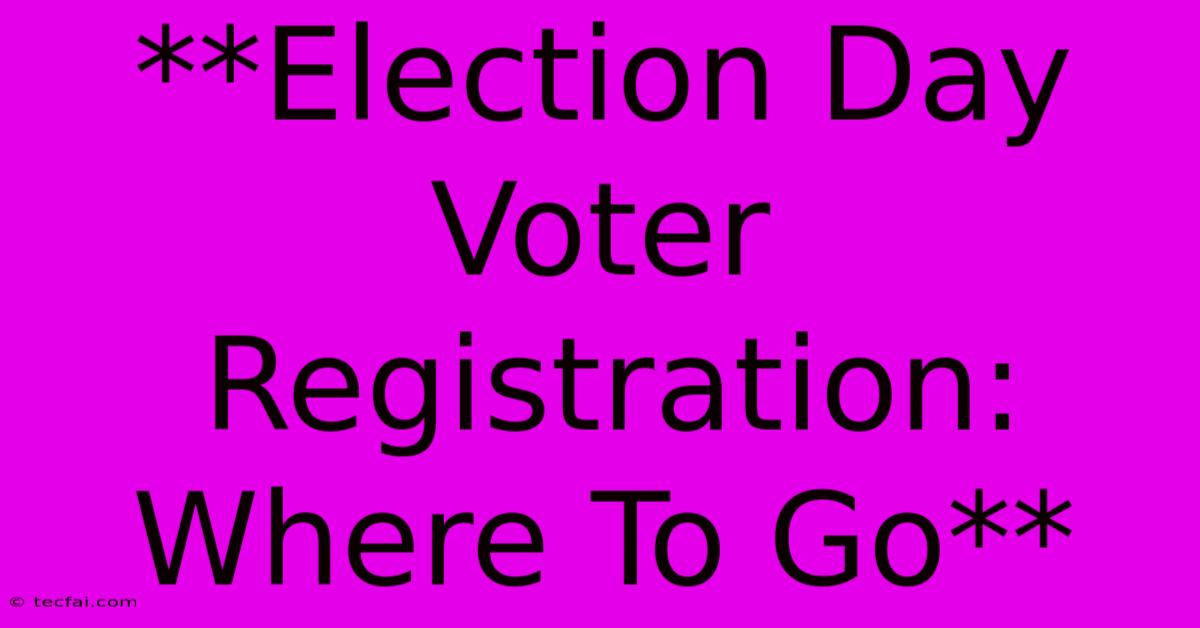**Election Day Voter Registration: Where To Go**

Discover more detailed and exciting information on our website. Click the link below to start your adventure: Visit Best Website tecfai.com. Don't miss out!
Table of Contents
Election Day Voter Registration: Where To Go
It's Election Day, and you realize you haven't registered to vote! Don't panic! In many states, you can still register and cast your ballot on the same day. This process is known as Election Day Voter Registration (EDVR).
While this option is available in some states, it's crucial to understand the rules and requirements. Here's a guide to help you find out where to go and what to expect:
Eligibility for Election Day Voter Registration
Not every state allows Election Day Voter Registration. To see if your state offers EDVR, you can visit Vote.org or the United States Election Assistance Commission (EAC) website.
Important Note: Even if your state allows EDVR, there are specific eligibility requirements. Typically, you must:
- Be a U.S. citizen
- Be a resident of the state and county you're registering in
- Be at least 18 years old on Election Day
- Not be currently incarcerated for a felony
Where to Register on Election Day
If your state allows EDVR, you can usually register and vote at:
- Your designated polling place: This is the location assigned to you based on your address.
- Early Voting Locations: Some states offer early voting, and these locations may also accept EDVR applications.
- Designated Registration Offices: Some states have specific offices where you can register.
Required Documents for Election Day Registration
To register and vote on Election Day, you'll likely need to provide specific documents. These typically include:
- Proof of residence: This can be a utility bill, bank statement, or other document with your name and address.
- Proof of identity: A driver's license, passport, or other government-issued ID is usually accepted.
- Social Security Number: You'll need to provide your Social Security Number for registration purposes.
The Registration Process
The registration process on Election Day is generally straightforward:
- Arrive at your designated polling place.
- Inform the poll workers that you'd like to register and vote.
- Complete the voter registration application.
- Present your required documentation.
- Cast your ballot.
Things to Keep in Mind
- Know your polling place: Locate your assigned polling place before Election Day to avoid any confusion.
- Be prepared with necessary documents: Gather your proof of residence, ID, and Social Security Number before heading to the polls.
- Allow extra time: The registration process can take longer than normal voting, so give yourself plenty of time.
- Check for any specific rules or requirements: Every state has its own rules regarding EDVR, so it's essential to research your state's guidelines before Election Day.
Why Election Day Registration is Important
EDVR helps increase voter turnout by making it easier for people to register and vote. It also allows eligible citizens who may have missed the registration deadline to participate in the democratic process.
By understanding the process and requirements, you can ensure that your vote counts, even if you're registering on Election Day itself.

Thank you for visiting our website wich cover about **Election Day Voter Registration: Where To Go**. We hope the information provided has been useful to you. Feel free to contact us if you have any questions or need further assistance. See you next time and dont miss to bookmark.
Featured Posts
-
Sporting Cp Dominates Man City 4 1 Match Report
Nov 06, 2024
-
Nrl Ace Joins Championship Club
Nov 06, 2024
-
How Trump Or Harris Could Win The Election
Nov 06, 2024
-
Trump Election Boosts Bitcoin To Record High
Nov 06, 2024
-
Trump Calls Out Fox News On Airtime
Nov 06, 2024
